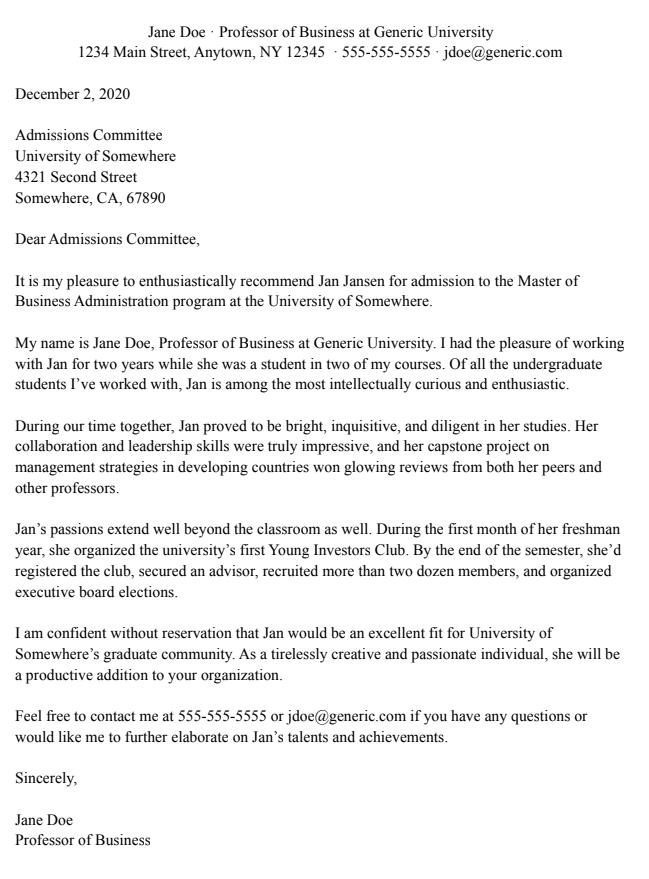
How to Write a Letter of Recommendation (Template + Tips)
A letter of recommendation is written on behalf of an applicant by someone who can vouch for that person’s educational or professional performance. This letter is typically sent to an admissions officer or hiring manager considering a candidate for admission, employment, or a scholarship. Explore how to write a letter of recommendation for a coworker, friend, or student.
How to write a letter of recommendation
Letters of recommendation help round out an application by offering insight into an applicant’s personal qualities, such as integrity, intellectual curiosity, or leadership potential. Writing a strong letter of recommendation from a teacher, counselor, manager, or co-worker can help give an applicant an edge over their competition.
Letter of recommendation template
Use this template to get started writing a properly formatted recommendation.
Letter of recommendation sample
Consider an example of a strong recommendation letter written using the template above.

How to format a letter of recommendation
Different organizations have different recommendation letter requirements. Be sure to ask the requester about any specific guidelines. In general, a letter or recommendation can be broken down into the following sections:
Date
Recipient Name
Recipient Title
Recipient Address
Greeting: Address the recipient by name if possible (Dear Ms/Mr).
Personal introduction: Begin the body of your letter by introducing who you are and your relationship to the applicant.
Recommendation: What makes the candidate a good fit? Offer specific examples of skills or qualifications that match the role.
Anecdote or example: Include a personal anecdote about what it’s like to work with the candidate. Include any workplace or people skills you’ve observed them to possess.
Closing: Give an overview of why you’d recommend this person.
Contact information: Provide your email address and phone number so the recipient can follow up.
Signature
Tips for writing a strong letter of recommendation
If you’re writing a recommendation letter, you likely want the candidate to have the best chance of getting a positive result. Explore some tips for writing a good letter that may stand out to admissions officers, potential employers, or anyone else reviewing the letter.
Do your research.
Find out what exactly the candidate is applying for. Ask them to provide:
A copy of the job description or academic program requirements
Their resume
Any particular skills, achievements, or qualifications they’d like you to highlight
This will help you focus your letter on the skills or qualifications that are specific to the role the candidate is applying for.
Be specific.
Please feel free to use a template (like the one above) to guide your writing, but remember to make it personal. Use examples and specific details to illustrate why this person is the best candidate. Choose strong, accurate adjectives over general terms or cliches.
Think about what the person reading the letter might want to know. Include details or insight that wouldn’t necessarily show up on a resume or application. Your letter should help the recipient get to know the person you are recommending.
Read more: How to Ask for a Letter of Recommendation (Template + Tips)
Stay positive.
Your recommendation should confirm that this candidate is a strong contender for whatever they’re applying for. Demonstrate honest enthusiasm, and avoid any comments that could be construed in a negative light. If you can make a superlative comparison between this person and others you’ve worked with (e.g. “She’s one of the best student aides I’ve had the pleasure to work with in my career as a professor.”), do so.
Keep it formal and concise.
Use a business letter format using a twelve-point font size in either Arial or Times New Roman. Write your letter on your business or organization letterhead if possible. The recipient likely reads dozens, if not hundreds of letters, so keep yours concise and to the point. Aim for at least one page but no more than two.
Say no if you need to.
If you feel like you’re unable to offer a glowing recommendation for a candidate, it’s okay to say no. A mediocre endorsement can often do as much damage as a negative one. While it may feel uncomfortable, respectfully declining a request is perfectly acceptable.
Follow the instructions.
You’re vouching for this person. Be sure to follow any specific submission guidelines carefully and get your letter in on time (or early). If your letter makes a good impression, that will carry over to the candidate you endorse.
How to ask for a letter of recommendation
Chances are that you’ll be asked to provide letters of recommendation as part of an application you’re submitting sometime during your education or career. This is particularly true when you’re applying for graduate programs. One or more letters of recommendation are almost always part of the application process.
Learn more about business writing on Coursera.
Learning how to write a letter of recommendation allows you to help others and build professional relationships. If you’d like to explore becoming a better writer, consider an online course like Good with Words: Writing and Editing Specialization offered by the University of Michigan on Coursera. This four-course series will help you expand your creativity, persuasion, and writing and editing.
Link nội dung: https://career.edu.vn/letter-of-recommendation-a51264.html